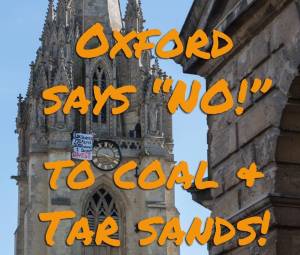Guest Post: Miriam Chapman, Fossil Free Oxford University
In the space of a week, two of the biggest universities in the UK took a stance on fossil fuels. Edinburgh said no to divestment, until viable alternatives could be found. Oxford said no to coal and tar sands investments, now and in the future. This is a huge win for the Oxford University Fossil Free campaign, as well as for the global divestment movement.
However, let’s not take this decision at face value. We’re cautious that calling this a win for divestment lets the University off the hook.

The decision Oxford made on Monday follows a two year campaign by students calling for full divestment. This started a process of committees, councils, reviews and consultations – and a lot of lobbying on our part. We have the support of 41 ‘common rooms’, which represents well over half of the student body, as well as 850 alumni and over 100 academics.
The Guardian article on Monday was sufficiently negative. Its subheading reads “UK’s second biggest university by endowment says it will not bow to campaigners’ demands for full divestment from fossil fuels”. This is true, and we will continue the campaign for full divestment. But first, let’s highlight some areas of the University’s statement that are left wanting. The University never did have any direct investments in coal and tar sands, but it’s nice to know they have ruled them out completely.
Now, ‘direct investments’ demands attention: how much is actually invested directly. The short answer – not very much. How much is invested indirectly in fossil fuels – we don’t actually know, and neither do they. The Oxford Endowment Fund had an estimated 3% exposure to the wider ‘energy sector’ – though this was not made public until after Monday’s meeting. Neither was the Socially Responsible Investment Review Committee (SRIRC)’s report, which makes for an interesting read. Transparency is a problem, and one that was highlighted by the SRIRC report.
It could be argued that the most valuable outcome of Monday’s decision was that we can now say “Oxford University says NO to coal and tar sands”. This is what ultimately matters for the divestment campaign as a whole. To quote Bill McKibben, Oxford “one of the greatest universities on the planet” has “shown great leadership in the fight against climate change”. It is the image that we project that has the main impact. It will influence other institutions, and hopefully ring alarms bell in the board rooms of fossil fuel companies.
However, this statement does need to be backed up by action to make it valid.Oxford will not invest in the most damaging fossil fuels, but nor has it ever. The statement the University made on Monday is very much that, a statement. There are no concrete ‘action points’ coming out of that meeting. Oxford University Endowment Management was applauded for their great stewardship, and asked nicely if they could report back to council a bit more, greatthanksgoodbye. They remain open to a wide variety of energy investments “where prudent”. We will continue our fight for fully fossil fuel divestment, and lobby for greater transparency within the University.
So, if you’re of the opinion that a media story has more impact than actual systematic change, then we’ve won. Unfortunately, as seen through 20+ years of climate negotiations, saying we’re acting on climate change doesn’t really do much at all. But it sure makes our Vice Chancellor Andrew Hamilton sleep better at night. Good luck NYU.
Alumni will be handing back their degrees to the University of Oxford in protest to the university’s refusal to divest from fossil fuels this Saturday 23 May. Join them! https://www.facebook.com/events/1571054153149617/